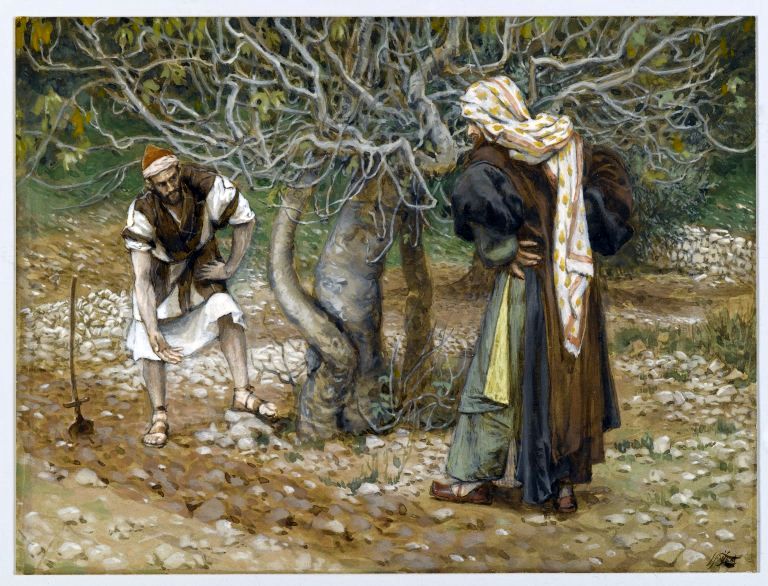
The Lectionary reading yesterday was from the Gospel of Luke, Chapter 13, verses 1-9. In the first part of this passage (verses 1-5) Jesus talks about the lesson we should learn from bad things happening to “innocent” people – that we need to repent or perish. I suspect that most pastors who preached on the Lectionary yesterday focused on these verses.
When I heard these words yesterday I was startled to hear another parable of Jesus: the parable of the bad fig tree. I have read through the entire Bible close to 40 times, and read through the New Testament more than that, but I never noticed this parable before yesterday. I even went back through my old sermons and found out that I had preached on verses 1-5 back in 1998, but I had never preached on the parable of the bad fig tree.
Here is the parable: “A man had a fig tree growing in his vineyard, and he went to look for fruit on it but did not find any. So he said to the man who took care of the vineyard, ‘For three years now I’ve been coming to look for fruit on this fig tree and haven’t found any. Cut it down! Why should it use up the soil?’ ‘Sir,’ the man replied, ‘leave it alone for one more year, and I’ll dig around it and fertilize it. If it bears fruit next year, fine! If not, then cut it down.’”
In the first part of the Lectionary reading, verses 1-5, Jesus reminds us that death can come at any moment, whether we “deserve” it or not, so we need to be ready. The parable of the bad fig tree tells a slightly different story. In the book of Leviticus, the Israelites are instructed not to harvest any fruit from trees for the first three years after they are planted. If they wait three years, they will have an abundant harvest. The owner of the fig tree had waited the three years. In the fourth year he came, expecting an abundant harvest, but still the fig tree had no fruit. It looked healthy, it may have even been beautifully ornamental, but it wasn’t doing the one thing a fig tree is supposed to be doing: bearing figs. The owner wanted to cut it down – he had already waited four years for this tree – and plant a tree that would do what it was supposed to.
But the man who took care of the vineyard asked for one more year for the fig tree. During that year he would loosen the soil around the roots, add fertilizer, and make sure it got plenty of water. After this special tending, if the fig tree didn’t bear fruit, then the vineyard worker would cut it down and plant another tree. We aren’t told the end of the parable. Did the owner insist the bad fig tree be chopped down anyway? Did the owner relent and give it one more year? Did the fig tree bear fruit at the end of the next year?
The open-endedness of the parable is part of its power. In order to live, the fig tree would have to change and bear figs.
We are the fig trees, God is the owner, and Jesus is the vineyard worker. What kind of fig trees are we? Do we bear fruit for the kingdom – the only true measure of whether we are doing what we are supposed to be doing as Christians? It doesn’t matter how beautiful we are on the outside if we aren’t producing fruit for the kingdom. It doesn’t matter how often we go to church or how many hours we read our Bibles. Jesus is warning us, if we don’t produce fruit for the kingdom (Matthew 28:19 – Therefore go and make disciples of all nations, baptizing them in the name of the Father and of the Son and of the Holy Spirit, and teaching them to obey everything I have commanded you.) we are in danger of being ripped away from the kingdom of God. Jesus loves us and pleads for us to have one more year, one more day so that we can change and begin to bear fruit, but God will only be patient with us for so long.
But it is hard for us to change. We get stuck in our lives and in our churches. We become self-satisfied and self-righteous. We think we are good enough, while we miss the point entirely. If we are Christians, our job is to make disciples, and if we are not doing this, we are bad fig trees. Change is very difficult and it starts with changing our own minds, our own hearts. Opening them and being willing to be used by God to fulfill our purpose as Christians.
I love the C.S. Lewis metaphor: “It may be hard for an egg to turn into a bird: it would be a jolly sight harder for it to learn to fly while remaining an egg. We are like eggs at present. And you cannot go on indefinitely being just an ordinary, decent egg. We must be hatched or go bad.”
Hatch or go bad. Bear fruit or be destroyed. Bad fig trees not allowed. The choice to change – or not change – is ours.
